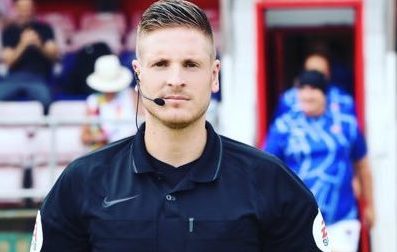Gay football referee Ryan Atkin says he’s spoken to many gay people in the sport yet to come out

Gay football referee Ryan Atkin. (Twitter)
Gay football referee Ryan Atkin. (Twitter)
The UK’s first openly gay football referee, Ryan Atkin, says publicly coming out was a “whirlwind” and that he’s since spoken to many closeted gay people in sport.
Atkin came out as gay in August 2017, becoming the first openly gay man refereeing in England’s professional leagues.
In the past two years, his career has progressed from working as an assistant referee in the English Football League to refereeing in the National League.
Speaking on the BBC’s ‘LGBT Sport’ podcast, Atkin said that it can be “disheartening” to know that there are other LGBT+ people working in football who don’t feel that they can publicly come out.
“Ultimately, within sport, you want the best people to get to the top and it should be through how good they are that they progress,” he said. “And what we want to do is to ensure that we’ve got a diverse pool of people who have the same opportunities if they are good enough.”
“It can sometimes be slightly disheartening to think that there are other people who are LGBT+ who don’t feel that it’s the right time for them, or [who don’t have] the confidence to come out.”
Atkin went on to say that, in his experience, there are several factors preventing LGBT+ people in football from coming out.
“I often speak to people who are not out, in sport, and say to them, ‘What are your fears?’,” he said. “And you get a mixture of responses as to why they wouldn’t choose to come out or why they won’t come out.”
“And so, I’m just hopeful that as time progresses, and especially within football the culture is slowly changing.
“What we’ve seen over the last two seasons unfortunately is a real undercurrent of racism, which I think is terribly, terribly sad in the year of 2019 and I think it has to be stamped out, it has to be addressed. If we haven’t even achieved that then, you know, homophobia in football is obviously trailing behind.”
Ryan Atkin said he tells people that coming out and living authentically will help them be the best at what they’re trying to do – be that in sport or in the workplace. But he added that the reasons people have for not coming out are understandable, and it’s the culture around homophobia in sports that needs to change for LGBT+ people to feel comfortable being their authentic selves.
“Sometimes it’s to do with family – they haven’t told their family, they are living a secret life,” he said. “Sometimes it’s to do with their position within sport or organisations and they feel that they don’t want that sort of media intrusion around their sexuality or their personal life – they want to focus on what they’re doing within the sport. Some people aren’t at that stage of acceptance of their sexuality themselves.”
“So, there’s a number of different factors that go into it. I think for me, you have to have all the stars aligned to feel truly comfortable that you are happy you’ve got the support from your family and friends, which is probably one of the most important things.
“You have to be comfortable in the organisation and profession that you work in. And thirdly, you’ve got to be ready and understand that the pedestal that some people then will put you on because you are then in the minority. If football was equal and there was a diverse mixture of people, you wouldn’t have people put on pedestals because it would have become – and I use this word loosely – the norm, and so there’s a lot of pressure around that role-model element as well.”
Finally, Ryan Atkin stressed how important it is for football to be a welcoming place for LGBT people.
“What we do not want is for parts of the community to feel that they cannot participate in sports because of their sexuality, their race, their gender, their religion or their faith – all of those different characteristics that make up the wonderful communities we live in,” he said.

